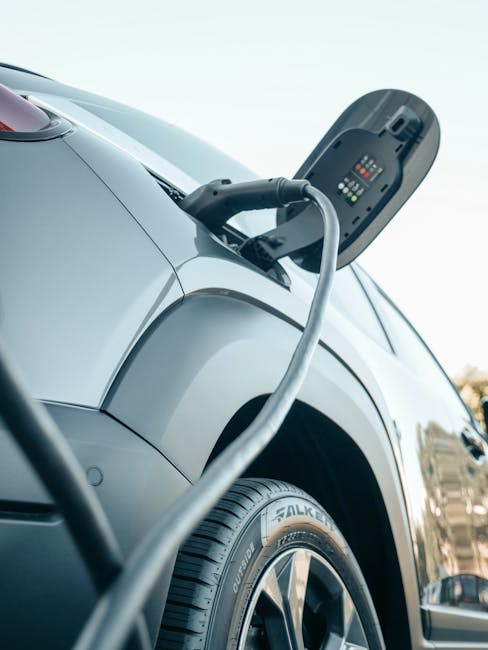Installing Home Chargers Can Be Tricky. Here's How To Avoid A Potential Fire - Related to increase, mansory, here's, be, home
Holden 93 per cent theft increase prompts police warning

Victoria Police believe one in five car thefts is now occurring this way, with more thefts happening to vehicles parked on the street as isolated thefts, not part of a burglary or other crime in the area.
Mansory strikes again. Behold the Elongation, the official name for this modified Tesla Cybertruck. Is it an ode to Elon? Is it double entendre? Or is......
Minivans are the sweatpants of the automotive world: unfashionable but very practical. Throw in a hybrid powertrain to keep the fuel bills down, and t......
Rumors that Nissan wants to replace its CEO began surfacing in the fallout from the automaker’s failed merger with Honda. Now, a new Bloomberg study ......
Of Course Mansory Made the Cybertruck Worse

Mansory strikes again. Behold the Elongation, the official name for this modified Tesla Cybertruck. Is it an ode to Elon? Is it double entendre? Or is it just plain ugly? Something tells us we can agree on at least one of those points.
By now, you probably know the Mansory playbook. The Cybertruck, known for its sharp stainless steel body, is kitted out with all kinds of carbon fiber bits thanks to the German tuner brand.
The front and rear bumpers are swapped over, now packed with winglets, vents, and diffusers. Connecting them is a patchwork of carbon fiber side sills and fender flares, the latter of which look like they were pulled from the pages of an Initial D manga. Mirror caps are carbon fiber. The vented hood is carbon fiber. There are faux vents on the C-pillars. And you can't call it a Mansory without tiny carbon fiber winglets at the back.
Photo by: Mansory Photo by: Mansory Photo by: Mansory.
Mind you, these are the carbon fiber components without light-up attributes. At the front, the Cybertruck's face gets a big carbon fiber panel with an illuminated Mansory logo in the middle. The tailgate doesn't get a full carbon fiber swap, but there's an overlay at the top with more Mansory lighting. An LED light bar atop the windshield adds more carbon fiber. And the wheels are 26-inch alloy rollers finished to look like carbon fiber.
That brings us to the interior, which is a mix of gray and white with yellow accents. Are those carbon fiber pedals we see in there? Mansory doesn't specify, but we definitely see carbon fiber sill plates for the doors. The leather is is punctuated with holes in a seemingly random pattern. Mansory branding is everywhere, though the firm says individual customization is available to buyers. If you're actually thinking about ordering one, please let us help you pick out a spec.
The Mansory Elongation certainly stands out. As for the kind of person seeking this kind of attention, that's an entirely different topic.
Tesla drivers in China are using the new Full Self-Driving enhancement and are racking up fines as the system drives in bike lanes and makes illegal turns.......
Changes to the bodywork for the GT2 Stradale also net considerably more downforce....
It's no secret that the vast majority of electric vehicle charging takes place at home. Nor is it a secret that not all Level 2 chargers are created e......
Installing Home Chargers Can Be Tricky. Here's How To Avoid A Potential Fire

It's no secret that the vast majority of electric vehicle charging takes place at home. Nor is it a secret that not all Level 2 chargers are created equal. But L2 installations, though often considered straightforward, aren't equal either. There's a lot of electricity going through those boxes. If anything isn't up to par, the consequences could be disastrous.
To hammer that point home, our man Tom Moloughney launched a segment on his State of Charge YouTube channel called Recharge Rescue. In short, he visits people having problems with their home chargers, explains what happened, and brings in a licensed electrician with EV experience to make everything right.
His series kicked off last year, but the latest installment takes us to Ohio for a Mustang Mach-E owner with a melted NEMA 14-50 outlet.
The video opens with some very significant advice: not all outlets advertised as industrial grade can cope with the rigors of continuous high-power use. Moloughney highlights a Leviton 279-S00 plug, which typically sells for around $10 and is described as being industrial grade. He compares it with a newer Leviton plug designed specifically for EV charging, and the differences between them are notable. The upgraded plug is considerably thicker with more metal inside and more effective mounting connections for the wiring on the housing.
The price difference is also notable—$66 versus $10. But Moloughney notes that the higher price is absolutely worth it for the improved quality and capability. In short, you pay more to get more.
Visiting the Mach-E owner, we see that the melted NEMA plug was indeed a smaller, lower-grade unit. In this particular case, the owner was fortunate a major fire didn't occur. The outlet got hot enough to fuse the charger's plug in place. Moloughney brought a new charger to install, and with an experienced electrician on hand, the outlet was eliminated completely in favor of hard-wiring. The breaker box was also updated with a 50-amp breaker—it was discovered that the previous electrician used a 60-amp breaker with 6 gauge Romex wiring to power the 50-amp outlet. The new charger was derated to 40 amps so it wouldn't overdraw the circuit.
The upgrade goes smoothly, but the takeaway from the video is to not skimp on your home installation. Hard wiring is generally the more effective way to, but if you opt for a plug, make sure it's not just industrial grade, but capable of handling extended power demands for EV charging. And it's also best to have a licensed electrician with EV experience handle the installation.
Who expressed you can't teach an old truck new tricks? The 2026 Ram 1500 Ramcharger, which is a name that harkens back to the late 1980s Dodge SU......
Toyota could bring back some hits from the 1990s based on reports of a new Celica and MR2.
Both cars would likely be powered by the organization's new G20......
Market Impact Analysis
Market Growth Trend
| 2018 | 2019 | 2020 | 2021 | 2022 | 2023 | 2024 |
|---|---|---|---|---|---|---|
| 8.3% | 10.0% | 10.5% | 11.6% | 12.3% | 12.7% | 12.8% |
Quarterly Growth Rate
| Q1 2024 | Q2 2024 | Q3 2024 | Q4 2024 |
|---|---|---|---|
| 10.9% | 11.7% | 12.4% | 12.8% |
Market Segments and Growth Drivers
| Segment | Market Share | Growth Rate |
|---|---|---|
| Connected Cars | 35% | 14.2% |
| Autonomous Driving | 22% | 18.5% |
| EV Technology | 28% | 21.9% |
| Telematics | 10% | 9.7% |
| Other Automotive Tech | 5% | 6.3% |
Technology Maturity Curve
Different technologies within the ecosystem are at varying stages of maturity:
Competitive Landscape Analysis
| Company | Market Share |
|---|---|
| Tesla | 16.9% |
| Waymo | 12.3% |
| NVIDIA DRIVE | 10.7% |
| Bosch | 9.5% |
| Continental | 7.8% |
Future Outlook and Predictions
The Holden Cent Theft landscape is evolving rapidly, driven by technological advancements, changing threat vectors, and shifting business requirements. Based on current trends and expert analyses, we can anticipate several significant developments across different time horizons:
Year-by-Year Technology Evolution
Based on current trajectory and expert analyses, we can project the following development timeline:
Technology Maturity Curve
Different technologies within the ecosystem are at varying stages of maturity, influencing adoption timelines and investment priorities:
Innovation Trigger
- Generative AI for specialized domains
- Blockchain for supply chain verification
Peak of Inflated Expectations
- Digital twins for business processes
- Quantum-resistant cryptography
Trough of Disillusionment
- Consumer AR/VR applications
- General-purpose blockchain
Slope of Enlightenment
- AI-driven analytics
- Edge computing
Plateau of Productivity
- Cloud infrastructure
- Mobile applications
Technology Evolution Timeline
- Technology adoption accelerating across industries
- digital transformation initiatives becoming mainstream
- Significant transformation of business processes through advanced technologies
- new digital business models emerging
- Fundamental shifts in how technology integrates with business and society
- emergence of new technology paradigms
Expert Perspectives
Leading experts in the automotive tech sector provide diverse perspectives on how the landscape will evolve over the coming years:
"Technology transformation will continue to accelerate, creating both challenges and opportunities."
— Industry Expert
"Organizations must balance innovation with practical implementation to achieve meaningful results."
— Technology Analyst
"The most successful adopters will focus on business outcomes rather than technology for its own sake."
— Research Director
Areas of Expert Consensus
- Acceleration of Innovation: The pace of technological evolution will continue to increase
- Practical Integration: Focus will shift from proof-of-concept to operational deployment
- Human-Technology Partnership: Most effective implementations will optimize human-machine collaboration
- Regulatory Influence: Regulatory frameworks will increasingly shape technology development
Short-Term Outlook (1-2 Years)
In the immediate future, organizations will focus on implementing and optimizing currently available technologies to address pressing automotive tech challenges:
- Technology adoption accelerating across industries
- digital transformation initiatives becoming mainstream
These developments will be characterized by incremental improvements to existing frameworks rather than revolutionary changes, with emphasis on practical deployment and measurable outcomes.
Mid-Term Outlook (3-5 Years)
As technologies mature and organizations adapt, more substantial transformations will emerge in how security is approached and implemented:
- Significant transformation of business processes through advanced technologies
- new digital business models emerging
This period will see significant changes in security architecture and operational models, with increasing automation and integration between previously siloed security functions. Organizations will shift from reactive to proactive security postures.
Long-Term Outlook (5+ Years)
Looking further ahead, more fundamental shifts will reshape how cybersecurity is conceptualized and implemented across digital ecosystems:
- Fundamental shifts in how technology integrates with business and society
- emergence of new technology paradigms
These long-term developments will likely require significant technical breakthroughs, new regulatory frameworks, and evolution in how organizations approach security as a fundamental business function rather than a technical discipline.
Key Risk Factors and Uncertainties
Several critical factors could significantly impact the trajectory of automotive tech evolution:
Organizations should monitor these factors closely and develop contingency strategies to mitigate potential negative impacts on technology implementation timelines.
Alternative Future Scenarios
The evolution of technology can follow different paths depending on various factors including regulatory developments, investment trends, technological breakthroughs, and market adoption. We analyze three potential scenarios:
Optimistic Scenario
Rapid adoption of advanced technologies with significant business impact
Key Drivers: Supportive regulatory environment, significant research breakthroughs, strong market incentives, and rapid user adoption.
Probability: 25-30%
Base Case Scenario
Measured implementation with incremental improvements
Key Drivers: Balanced regulatory approach, steady technological progress, and selective implementation based on clear ROI.
Probability: 50-60%
Conservative Scenario
Technical and organizational barriers limiting effective adoption
Key Drivers: Restrictive regulations, technical limitations, implementation challenges, and risk-averse organizational cultures.
Probability: 15-20%
Scenario Comparison Matrix
| Factor | Optimistic | Base Case | Conservative |
|---|---|---|---|
| Implementation Timeline | Accelerated | Steady | Delayed |
| Market Adoption | Widespread | Selective | Limited |
| Technology Evolution | Rapid | Progressive | Incremental |
| Regulatory Environment | Supportive | Balanced | Restrictive |
| Business Impact | Transformative | Significant | Modest |
Transformational Impact
Technology becoming increasingly embedded in all aspects of business operations. This evolution will necessitate significant changes in organizational structures, talent development, and strategic planning processes.
The convergence of multiple technological trends—including artificial intelligence, quantum computing, and ubiquitous connectivity—will create both unprecedented security challenges and innovative defensive capabilities.
Implementation Challenges
Technical complexity and organizational readiness remain key challenges. Organizations will need to develop comprehensive change management strategies to successfully navigate these transitions.
Regulatory uncertainty, particularly around emerging technologies like AI in security applications, will require flexible security architectures that can adapt to evolving compliance requirements.
Key Innovations to Watch
Artificial intelligence, distributed systems, and automation technologies leading innovation. Organizations should monitor these developments closely to maintain competitive advantages and effective security postures.
Strategic investments in research partnerships, technology pilots, and talent development will position forward-thinking organizations to leverage these innovations early in their development cycle.
Technical Glossary
Key technical terms and definitions to help understand the technologies discussed in this article.
Understanding the following technical concepts is essential for grasping the full implications of the security threats and defensive measures discussed in this article. These definitions provide context for both technical and non-technical readers.


